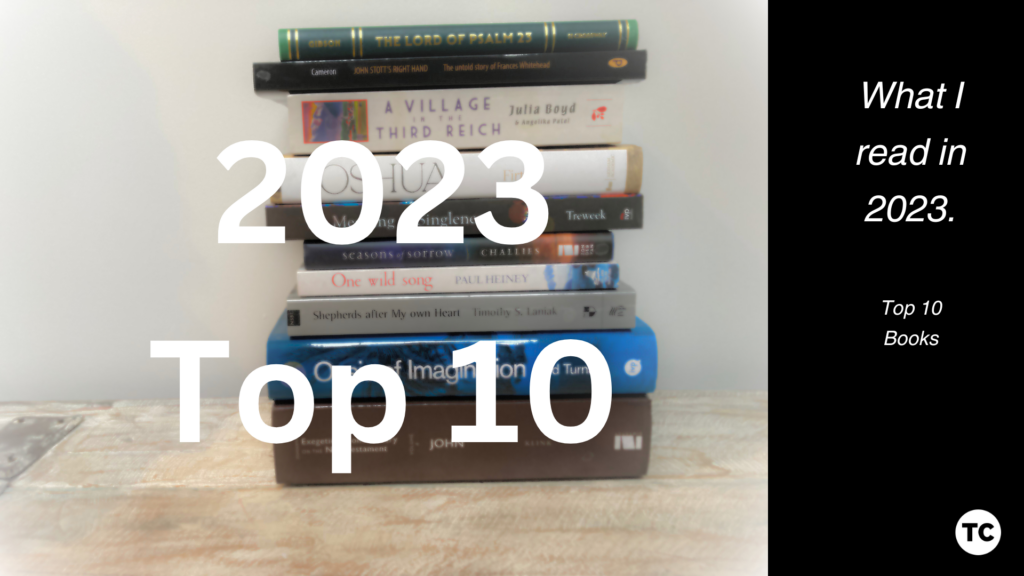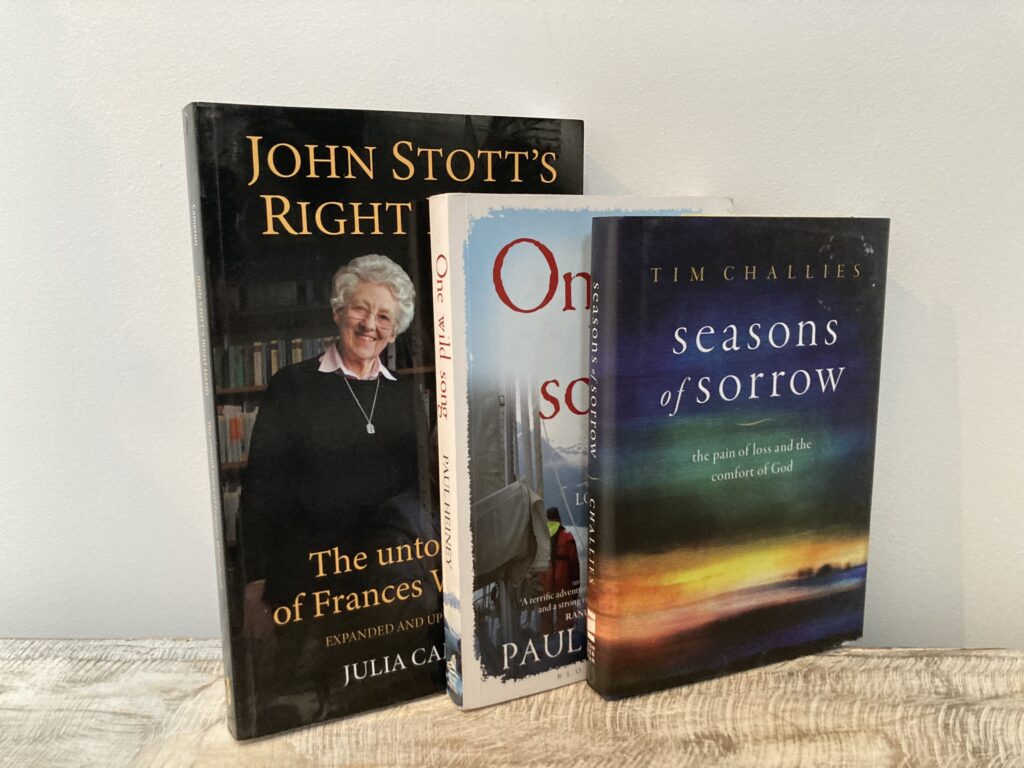After a few years of having top 20, or a top 21 for 2021 and so on, this year I came to the realisation that doing that was a fool’s game – hypothetically, by 2080, I might be only reading around 60 books, yet feeling the need to do a top 80. So here, to be clear, are my Top Ten Books that I read in 2023. The top three are very close – and depending on your faith tradition, personal situation, and interest in sailing, you will likely not like them as much as I did. If you are so inclined, you can also read The Long List of everything I read in 2023, and my Top Twenty Commentaries.
I decided when I started commissioning and editing books to exclude those from my Top Ten lists – you can find out more about what I’ve been working on in a sporadic blog series.

10 – Shepherds After my Own Heart. Timothy S Laniak’s NSBT on a biblical theology of leadership is a modern classic – and inheriting a clearly well-thumbed copy from a friend who died made reading it all the more poignant. This is an excellent book about leadership, and one that I hope is still being read. Being in the NSBT series, it is a reminder to me, with some influence on it, to keep leaning into the deeper forms of biblical theology, and to shepherd that series to serve the church well.
9 – A Village in the Third Reich. This is a history book that reads like a novel and a careful analysis of ordinary people undergoing extraordinary change. The authors trace the events that transpired in a German Alpine tourist village, up to and through the Second World War. It is a profound reflection on human nature, how ideas and peer pressure work, and a very different angle on Nazi Germany than I’ve read before. I’ll keep an eye out for other books by the same author and will ponder what an IVP book in a similar style could look like.
8 – John ZECNT. Klink has written what is now for me probably the commentary on John I’d most recommend to most people, most of the time. This was that relatively rare thing, a commentary that was both a good commentary and a good book – I expand more in my review.
7 – The Lord of Psalm 23. This is David Gibson’s second appearance in my shortlist of books (I appreciated his ‘Radically Whole’ last year). This is a lovely little book on just one chapter of scripture, Psalm 23, which can very often feel like it’s been over-read, over-sung, and over-quoted. Gibson shows us Psalm 23 has, as is ever the case with scripture, layers, and depths of truth to speak to our hearts. You can read my review here.
6 – The Meaning of Singleness. Good books on singleness are a rare thing – and this is superb. Treweek modifies her doctoral work into a book that challenges cultural shibboleths, gives us biblical and historical grounding for some exciting theology, AND shows us ways in which we can do better as churches. Do check out my review here – particularly if you are involved in pastoring.
5 – Joshua EBTC. The other commentary in this top ten was a pleasure to read and opened up the book of Joshua both as a specific part of Scripture and as a key to many other parts of Scripture. As I said in my review: “Overall, I think this is a successful commentary in that it faithfully engages the text, conforms beautifully to its series style, and is rich with application and inspiration/encouragement for the Christian reader of Scripture. It’s difficult to get across, though, just how unusual for a commentary this is – I read and work on lots, but this is a book that I would re-read, and it will likely be in my Top Ten this year.” Written March, it’s a mark of the book’s quality that it is in the Top Ten and even the Top Five.
4 – Oasis Of Imagination. Working for a publisher means I have to be careful not to just say that the ten books I edited this year are the best ten I read – I have a rule that I won’t flag the ones I’ve worked on. That means I am delighted when a colleague’s project is superb – this major work on culture and imagination by Ted Turnau is excellent. It builds on his modern classic Popologetics, does cultural engagement better than the much-lauded but underwhelming Biblical Critical Theory, and is also good fun, readable, and engaged with a wide variety of cultural artefacts. Had I not read the next three, it could have been my book of the year, and it also has a wonderful smaller companion volume, Imagination Manifesto.

3 – John Stott’s Right Hand. Working in publishing, I tend to read either newer books, for various reasons, or things for relaxation. I do try to read other books – and in 2024, I intend to read some older books – but this paperback from 2014 (updated in 2021, I believe) was an unexpected gem. You’ve probably heard of John Stott- and some may even have heard of Frances Whitehead, his loyal assistant and friend. This is her story, and as well as that it is a book that is profoundly helpful for reflecting on how our lives and callings come together, and for thinking about vocation and how God would have us use our gifts. You can read my review here.
2 – One Wild Song, by Paul Heiney. One of two books I read this year that were extended reflections on a son’s death. This was a ‘non-Christian’, ‘Christ Haunted’, sailing-based one, and I loved it. It is difficult to say what I loved about this book without talking about Libby Purves’ One Summers Grace, Paul Heiney’s The Last Man Across the Atlantic, and (the lost son in the subtitle and Paul’s elder child) Nicholas’s The Song at the World’s End. This book is a powerful insight into grief, a beautiful sailing travelogue, and one that will stay with me and probably force a re-read soon.
1 – Seasons of Sorrow. Tim Challies lost his son Nick very unexpectedly at a young age. This book is a painful, profound, and beautiful narrative of reflection on the first year without a beloved child, ending again at his son’s grave. I wrote a longer review here, but suffice to say this is now the book I’ll recommend on grief, and it is also a masterpiece of theological and emotional honesty.
The top three are very close – and depending on your faith tradition, personal situation, and interest in sailing, you will likely not like them as much as I did. If you are so inclined, you can also read The Long List of everything I read in 2023, and my Top Twenty Commentaries.
Leave a Reply